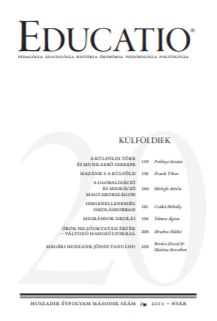
Muszlim közösségek helyzete Európában
Review of: Anna Triandafyllidou [ed.]: “Muslims in 21st Century Europe: Structural and Cultural Perspectives.”; Routledge, 2010, Milton Park. 224 p. by: Darvai Tibor
More...We kindly inform you that, as long as the subject affiliation of our 300.000+ articles is in progress, you might get unsufficient or no results on your third level or second level search. In this case, please broaden your search criteria.

Review of: Anna Triandafyllidou [ed.]: “Muslims in 21st Century Europe: Structural and Cultural Perspectives.”; Routledge, 2010, Milton Park. 224 p. by: Darvai Tibor
More...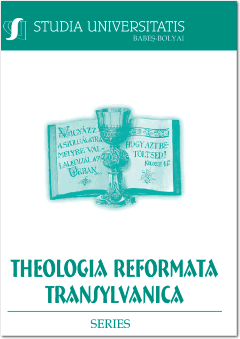
A 18. és 19. század komplex, egymást feltételező, egymásból fakadó jelenségeit új vizsgálat tárgyává kell tenni. A magyar nyelvű homiletikai tankönyvek megjelenési éveihez (1784–1878) mint nagyobb távlatban korszakváltó határokhoz kötött értekezés a korabeli prédikációs gyakorlat újraértékeléséhez akar forrásokat, összetevőket, összefüggéseket felkínálni.
More...
Az egyházi év kutatása bonyolult kérdés és komplex ismereteket igényel. Az egyháztörténeti, egyházjogi fejlődésen túl a szertartáskönyvek és ágendák, prédikációs könyvek, prédikációs és egyházzenei gyakorlat összefüggéseit és történeti változásait kell figyelembe venni. A csak egyes részterületekre koncentráló kutatás hamis eredményeket és következtetéseket eredményezhet. E komplexitásnak jeles ismerőjeként mutatja be magát Az egyházi év című könyvében Pap Ferenc, a Károli Gáspár Református Egyetem kiváló oktatója.
More...
Eight decades are precisely marked since Nachfolge, the work of the Lutheran pastor and theologian Dietrich Bonhoeffer (1906–1945), has appeared in the German realm (1937). In 2009, 72 years since that date, the Cluj publisher Peregrinul, published this book in Romanian language. There lies a possibility of the title being translated literally but hermetically, such as: „Succession”,„Emulation”, or „Imitation”. The latter refers to a writing by a medieval monk called Hammerkin, Die Nachfolge Christi (it is about the extremely well known work by Thomas a Kempis, Imitatio Christi). Ligia Taloș – the translator of Bonhoeffer’s work – chose a title accessible to the common Christian reader, probably drawing inspiration from the English version The Cost of Discipleship.
More...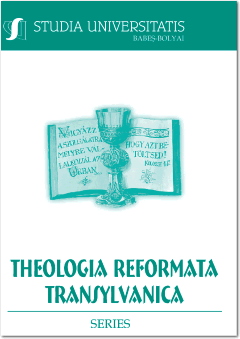
This lecture endeavors to answer the following questions: In what sense was the 500th anniversary of the reformation different from any previous celebrations? What is the relationship between modernity and the reformation? Does the reformation have a formative role in the contemporary society? This study breaks with the traditional and linear interpretation of modernity and offers reverse methodology, starting from the vantage point of the modern society, and from this angle, examines the religious and theological impulses, and those interfaith dynamics that can have a role in shaping/modeling a peaceful coexistence of cultures and religions. These impulses are: the necessary interaction between various branches of science and religion in the academic setting. The value of the spiritual/theological interpretation of reality in our society. The freedom of conscience and religious thought in the secular state and in the church, and the preservation of self-identity in the age of mass manipulation. Pondering over these issues can and will make our celebration more relevant in the contemporary setting.
More...
Social integration was and continues to be a vital need of all historical periods. Even from the Mosaic Period, God was extremely preoccupied with the way Jewish people would integrate socially under-privileged people (orphans, widows, poor people and strangers). Moreover, the Old Testament Law stipulated for a social integration of Levites and Priests. The current article aims to give an in-depth analysis of the way how all these under-privileged social categories ought to have been regarded and treated. In addition, within the same article it has been highlighted that there was a legal demand both in Antiquity (through the code of Hamurabi) and Semitic World to integrate the under-privileged people, this issue was often the responsibility of the acting king.
More...
The gospels inform us that following the calling of Jesus, the disciples forsook their trade, their homes, and the members of their families. In brief, they left everything behind, what they lived from and for. Jesus says very clearly that following him is only possible, if the one called denies himself and takes his cross up. On the other hand, he promises that he who forsakes his house, or brothers, or sisters, or parents, or children or fields for him will receive a hundred times as much in this present age, with persecution, and later, eternal life as a reward. In Mt 19,28 (cf. Lk 22,29-30, where they receive the promise of the kingdom too), Jesus promises the twelve disciples that they will sit on thrones and that they will judge Israel. If someone leaves his fortune, but sticks to his trade, he can still hope to regain his possessions. The return to a forsaken trade was difficult (Jn 21,2-3), if possible. After leaving possessions and occupation, the forsaking of one’s family follows. This is more difficult, because it demands the undoing of ties of blood which are deeply rooted in humanity. Jesus does not stop here. He goes even deeper in the question of self-giving and self-denial of the nominees for discipleship. Someone, though with a heavy heart, in difficulties could give up everything and everybody who is outside of him, but Jesus asks the utmost here, the called person’s life. Jesus had two kinds of disciples. On one hand, there were those who obeyed the calling and immediately left everything and followed him. On the other hand, others accepted him as their Master and Saviour, but they stayed at home, in the midst of their families and in possession of their properties. These two groups are called the wandering and the sedentary disciples. For the twelve disciples, following Jesus includes the break with the old connections, with those material or family bonds, because the disciple starts an entirely new relationship with Jesus, as their teacher. In the light of 1Cor 9,5, the questions about a radical break with occupations, possessions and families remains open, since Paul mentions that the apostles and Peter took their wives on their mission trips with them. One possible explanation is that when Jesus called the twelve disciples, they had to break with everything which defined their earlier life and follow him this way. On the other hand, there were disciples who served Jesus and his followers with their material goods. After the death and resurrection of Jesus, a different situation pertained, and then the married apostles carried out their service together with their wives. The fact that when the disciples left their wives and children, they were not the only ones to suffer, but so were their relatives, whom they left on their own for a while (until Easter). Another possible explanation could be formed, if we discuss this question in the light of 1Cor 7,29–31 where Paul speaks of a symbolic break.Jesus calls the disciples, and the Twelve breaks with everything what determined their former lives, and follow their master. Their life is characterized by poverty and wandering, while they experience miracles in the company of Jesus. They continue the mission after the death and resurrection of their master. After a while, it starts a process of becoming petty bourgeoisie, during which the second generation of disciples stop wandering and leaving behind possessions, and they live as sedentary disciples in their families.
More...
The article discusses a theological debate on church discipline between Calvinist pastors living in the French speaking territory of Pays de Vaud and the Zwinglian City-state of Berne from the mid-1530s to 1560. From 1536 Pays de Vaud be-longed to the Bernese protestant administration but consisted primarily of French refugee pastors allegiant to Calvin and his ideas. They Calvinists of Pays de Vaud questioned the civil magistrate’s right to interfere into church affairs especially into the practice of church discipline, such as exclusion from the Lord’s Supper and excommunication from the congregation. According to the Zwinglian establishment of Berne the right for exclusion and excommunication belonged to the civil magistrates. In the Calvinists’ view the appropriate administrator of the exclusion and excommunication was the Genevian-type consistory, consisting of both clerical and civilian elected members.Noteworthy significance can be attributed to the events in the Pays de Vaud. On the one hand, banished from Bernese territory most of the Calvinist pastors of Vaud were sent to reinforce the French underground evangelical movement. The Calvinists’ failure in the Pays de Vaud turned Calvin’s attention to France by which the Calvinism became a world phenomenon. On the other hand, from this struggle emerged a theological justification for the state’s supremacy over church affairs, namely by Wolfgang Musculus’ De Magis-tratibus. Interestingly, this justification played a more important role in later times than in the actual controversy: Thomas Erastus, the builder of the territorial state–church of the Palatinate, John Withgift, the archbishop of Canterbury and the protector of Tudor-Absolutism against the Puritans, and the Dutch Remon-strants all were influenced by the teaching of Musculus. The goal of this paper is to present how the two controversial sides regulated its church affairs and, in addition, to show the highpoint of the debate between Calvin’s Vaudois adherers and the Bernese Magistrate for the government of the church, especially for the right of excommunication.
More...
One of the most important persons of the Hungarian 1848 war for freedom was General János Damjanich, one person with Serbian origin. His wife, Emília Csernovits, who’s family originally was Serbian, was so young, when her husband were executed by the Hapsburg Empire as leader of Hungarian war for freedom. She gets a great respect from the soldiers of war for freedom, and from the civilians in all country. Many people refugees after the lost war to Turks Empire and to Egypt. After twenty years they founded the Association of Hungarian People in Cairo and a same organization in Constantinople. They wrote some letters to Emilia Csernovics to be the honorific leader – the Ensign Mother – for this Organization. We publish here some correspondent between the different Hungarian organizations and Csernovics Emília.
More...
The formation of the Protestant church hierarchy started already when a separate position was established to ordinate Protestant pastors. Protestants did not regard priests as separate ordo, and yet, after its organization az church it inherited or acquired those privileges, which were available for the Roman Catholic priests also. They enjoyed tax-exemption, they were provided with the tithe, parish houses were regarded as noble mansions, soldiers were never quartiered in them, and lawsuits could be started against pastors only at ecclesiastic courts. Transylvania did not have a bishop after 1542, as Johann Statileo died, the right of ordination was practiced by vicars.The pursuance of the Reformation trends was also influenced by the boards of the former archdiaconates. The formation of the latter Transtibiscan Church District had three centers. The strengthening of the Reformed episcopal power happened during the time of Reformed rulers.The Reformed princes of the beginning of the 16th century implicated themselves in the problems of the religion, which became the leader in Transylvania and Partium, and in this way had a major influence over the church administration also.
More...
Women representation in media has been a hot debate for many years. More specifically the debate about Muslim women converts. Their cases represent a fertile ground to be investigated as belonging to a community that has been discussed for a long time in academia; mainly, after the phenomenon of Islamophobia and the struggle to improve the status of Muslim women in their societies. Moreover; studies concerning Muslim women converts were almost based on narratives and stories (Mansoureh Chavoshpour 1998, Caroline Neumueller 2012, Sabina Catlin Wahl 2014 ). The current study aims at examining critically the portrayal of Muslim converts through Algerian media mainly newspaper articles. It is intended to unveil the ideological representation of women who converted to Islam under media coverage and to disclose the extent of credibility of this depiction. This study based on CDA investigates the discursive portrayal of female Muslim converts in Algerian media discourse. In order to meet the objectives of this research, following the framework provided by Van Leeuwen (1996–2008), articles collected from Algerian newspapers are analyzed with a specific focus on stereotypes perpetuated about Muslim women converts.
More...
The essential promise of the mediation is that it can help to avoid on both sides the dead-end defined in the research results of the Harward Negotiation Project, which reduces the chance of an agreement. Mediation creates a possibility for the parties to overcome on one side the attitude, which struggles to subordinate the strengths of the other side. This occurs, when any of the parties emphasizes only his own interpretation about the situation, or offers only his own solution proposals, without any kind of self-reflection or the curiosity towards the arguments of the other party. This attitude is labeled: “the parties are enemies”. On the other side, mediation overcomes the attitude, which would seek at any price a modus vivendi, through compromises, which lead to abandoning the own principles. This attitude is labeled: “the parties are friends”. Mediation also helps finding a new ability of the parties meant to coexistence to provide common efforts. This attitude is labeled: “the parties want to solve problems”. The last possibility among the mutual satisfaction may ground for long term the effective cooperation and success of the parties. On this level it may lead to communicative action.In this study I analyze the narratives and thematization of the mediation in the local literature from the point of view of finding an answer to the question: to what account does the process of mediation make possible the realization of the communicative action (Ferenczi, 2010)
More...
In the introduction the study presents the biological, physical, medical and psychological aspects of old age. It also focuses on the religious and philosophical changes. Among the psychological particularities of gerontology it presents the competencies, which are the “privileges” of old age and the process of getting old: wisdom, social and financial freedom, human relationships, experience.It emphasizes that the process of getting old differs from men to women, enumerates the characteristics of the two genders, highlighting the differences. A few examples of different types of attitude towards the changing feelings about life: loneliness, solitude, grief, pain, feeling of being dependent and vulnerable.Old people change their attitude towards religion, spirituality, it gets deeper, as the spiritual experience of “belonging to God”.
More...
The basic assumption of this article is that the (pastoral) care giver must provide not only psychological support to those in need in their difficult life situations, but in addition to that she/he should give assistance to find meaning of the psychic reactions befallen under the given circumstances and contextual effects. Care giving in believing aims both to raise trust in God and to help evaluating the situation according to the truth of God. The Reformed tradition emphasized the cognitive aspect of faith with the same strength as well as the affective aspect, the “wholehearted trust”. The latest pastoral care almost leaves out of eyesight the content of faith and does not endeavor to change the conviction of the client. As if it would go along with the demand of truth-plurality of the postmodern world. Although there is no theological, nor psychological reason to do so. From theological point of view, we should perceive faith both as an affective commitment, also a novel cognitive process reflection upon ourselves, others and the world through the lenses of God’s truth. From psychological view we can say that we evaluate and shape our inner and outer positions of our lives according to our basic convictions. The aim of pastoral care would be to help the clients to turn the basic convictions of hopelessness into real faith contents (credition), that radically change their perceiving and living through the different situations. By this approach could become the pastoral care a helping device of nurturing thinking faith that is in accord with the Reformed tradition and the truths of God’s Word.
More...
The topic is actual on one hand because of the 500th anniversary of Reformation, on the other hand because of the identity crisis particular to transition periods. From time to time we should rethink which factors define the reformed identity. From these theological concepts forming the identity this study focuses on faith. Based on the reformed definition of faith it involves intellect, emotion and will, so faith has cognitive, emotive and volitive aspects. The last one involves confession and living the faith. Confession is much more than a testimony in words, the works of love and a lifestyle reflecting the confessed values also belong to it.In the protestant view acts of kindness do not precede, earn salvation, they follow it, as acts of thankfulness. There is healthy spirituality only if the three aspects of the faith are in balance. The last ideas refer to the development of faith in all of the three directions, there are given some examples from church history.
More...
A Refo500 keretében megjelent kiadványok között méltó helyet érdemel Lányi Gábor János könyve, amely egyben a szerző doktori dolgozata is. Az egyházfegyelem, egyházfegyelmezés kérdésköre napjainkban újabb és újabb kérdéseket vet fel a református egyház mindennapi gyakorlatában. A szerző visszanyúlik a kálvinista gyökerekhez, mintegy igazolva a találó főcímet: „a kálvinizmus nyitányát”.
More...
Napjainkban minden harmadik házasság „válásra van ítélve”, a házasság, a család intézménye válságával kell szembenéznünk. E tény elbátortalanodásra ad okot a házasulandók számára. Ezzel a pesszimizmussal szemben vette fel a harcot Dr. Mészáros Ádám, azzal, hogy tapasztalatai alapján megírt egy olyan kézikönyvet, amely még a címével is buzdít, reményt ad és bátorságot a hithez, hogy létezik, lehetséges olyan házasságban élni, amelyben a szerelem örök. Az utópisztikusnak tűnő reménysugarat az elmúlt közel tíz év praxis-tapasztalatából, házassági tréningjeiből meríti.
More...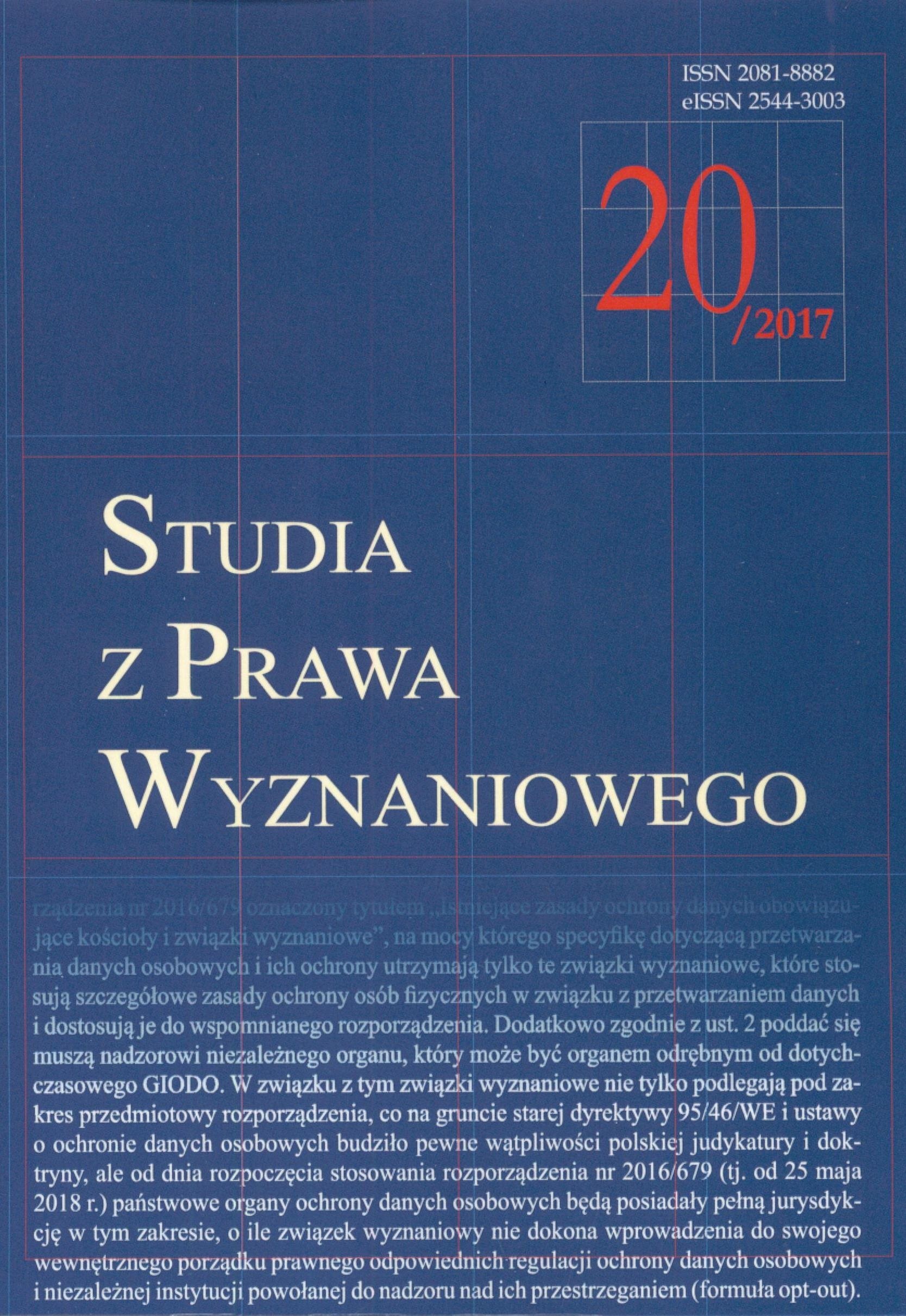
Switzerland is currently confronted with a strong political movement that aims at restricting civil rights of certain minority groups, in particular Muslims. This has led to several limitations to their religious practices, some of them even approved by popular vote. From a legal point of view, the question arises which role this shift in politics plays in the Federal Supreme Court’s interpretation of the fundamental right to freedom of religion granted by the Swiss Constitution in cases regarding Muslims. By means of a case study in the field of public education, this paper examines how the political environment influences the relevant case law. It arrives at the conclusion that although the Court was at first following the political trend of restricting Muslims’ fundamental rights, it has taken a stronger stand against such tendencies in recent decisions.
More...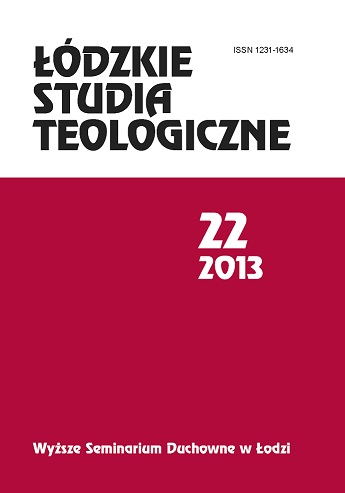
The works of Averroes belong to the heritage of both East (dar al-Islam) and West (orbis christianorum). In the circle of Muslim culture he has become the representative of the Andalusian rationalism. He tried to enter the Aristotelian discourse on the exegesis of the Qur’an and to show that philosophy is contained in the holy book of Islam. Particularly important was the methodology for arriving at the truth by demonstration which is the highest form of logical deduction. Averroes tried to argue that because the Quran contains everything, it also includes philosophy. He used verses of the Quran as premises in syllogistic evidence. His solutions were interesting but finally have been marginalized by the Muslim orthodoxy and he was banished. In the West, Averroes was known as a commentator of Aristotle. However, his original works were little known. In his commentary on the De Anima some medieval thinkers have found a few controversies. The most important of these were the theory of monopsychism, recognition of determinism and eternity of the world and the negation of God’s providence. Recent studies on the works of Averroes have shown that the many allegations made against him were not sufficient justification against his works. Controversy over Averroes show that he is a tragic figure. Although he could have become a bridge between East and West, he was rejected by both parties.
More...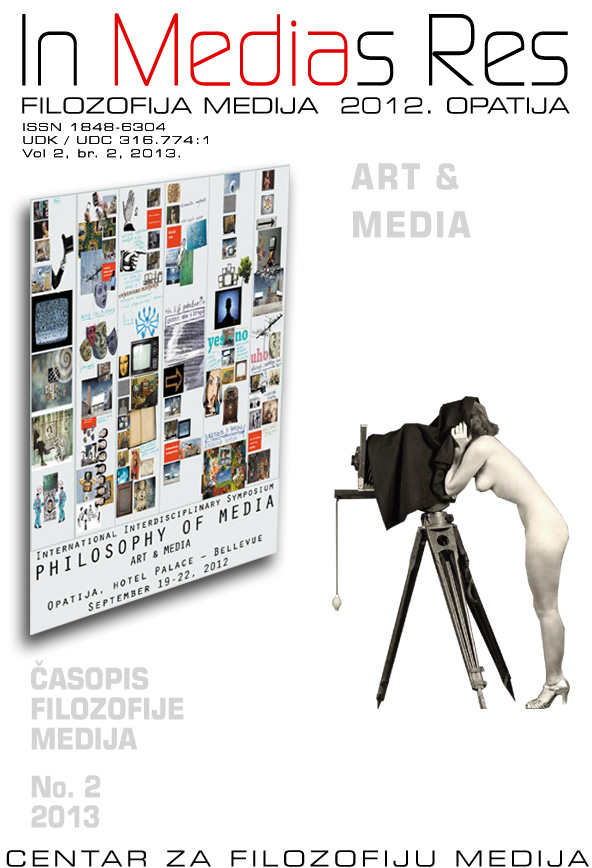
Sufism confuses the scholars because it is not in accordance with the strict canons of rational knowledge. Sufi gnosis is taught by the interaction of teacher’s and student’s spirit, and in the process of transferring, to rational methods "not transferable", together with stories, anecdotes, allegory, metaphor, music, dance, the role of poetry as an important media, is of great importance. Sufi poetry has its outside and inside, and its message can not be explained by rational theorizing, and is understandable only to those who share the same experience. Zen koans have similar function. It is considered that the oldest spiritual records of the world, were incurred by the interaction between man and God. Word / Logos /, as the supreme manifestation of God, was announced to selected individuals, and for centuries passed down from teacher to pupil orally. An important aspect of understanding Sufi texts, ancient knowledge in general, is the symbolism of the letters (letter mysticism), where the emphasis is on the mystical meaning of single letters and their schedule in words.
More...